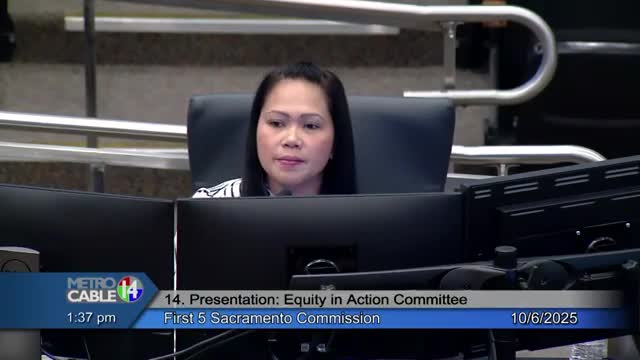Equity in Action committee outlines outreach and three-tier grant approach as demand exceeds available funds
October 20, 2025 | Sacramento County, California
This article was created by AI summarizing key points discussed. AI makes mistakes, so for full details and context, please refer to the video of the full meeting. Please report any errors so we can fix them. Report an error »

The Equity in Action Committee reported progress and a draft grant structure to the First 5 Sacramento Commission on Oct. 6, describing a community-led process and a three-tier funding framework designed to reach smaller community-based organizations and parent-led groups.
Yasmine Herrera Vilchez, a committee member from Rancho Cordova, said the 15-member committee has met since June and has prioritized four funding categories: programs that meet immediate family needs (diapers, housing help, mental health), supports for developmental and parenting skills, systems-change work that reforms rules and practices, and parent leadership/organizing. The committee also recommended a small one-time grant option of $5,000–$9,999 for materials, supplies and capacity building.
Julie (the commission’s executive director) told commissioners earlier in the meeting that staff had already received more than 170 letters of interest totaling over $21,000,000 in requests for approximately $4,200,000 available for this equity initiative; staff said the applicants are largely organizations that have not received First 5 funding in the last 15 years and operate in 14 target neighborhoods.
The committee’s outreach included social media ads on Facebook, Instagram and LinkedIn, a media advisory, digital and print ads through the Sacramento Observer, a Metro Cable spot, and direct emails to about 1,500 organizations and contacts. Committee members said the selection process initially favored organizations with existing administrative capacity, and the committee recommended changes to reduce structural barriers (audit and insurance requirements, advance payment policies) that can keep smaller groups from applying.
Commissioners and community members asked for clarity on grant tiers and program intent. Committee members explained the three tiers: small one-time awards ($5,000–$9,999), mid-tier grants (approximately $125,000 to $300,000 over 2.5 years), and larger grants ($301,000 to $500,000). The committee said it intends to return recommended applicants and selection outcomes to the commission; staff cautioned some county contracting policies (insurance, advances) may need administrative adjustments to make awards accessible to grassroots groups.
Community members emphasized the committee’s role in questioning assumptions and making outreach more inclusive. Maria Lopez, a committee member, said the group is ‘‘questioning answers’’ and focusing on removing barriers so small organizations can access funding.
Yasmine Herrera Vilchez, a committee member from Rancho Cordova, said the 15-member committee has met since June and has prioritized four funding categories: programs that meet immediate family needs (diapers, housing help, mental health), supports for developmental and parenting skills, systems-change work that reforms rules and practices, and parent leadership/organizing. The committee also recommended a small one-time grant option of $5,000–$9,999 for materials, supplies and capacity building.
Julie (the commission’s executive director) told commissioners earlier in the meeting that staff had already received more than 170 letters of interest totaling over $21,000,000 in requests for approximately $4,200,000 available for this equity initiative; staff said the applicants are largely organizations that have not received First 5 funding in the last 15 years and operate in 14 target neighborhoods.
The committee’s outreach included social media ads on Facebook, Instagram and LinkedIn, a media advisory, digital and print ads through the Sacramento Observer, a Metro Cable spot, and direct emails to about 1,500 organizations and contacts. Committee members said the selection process initially favored organizations with existing administrative capacity, and the committee recommended changes to reduce structural barriers (audit and insurance requirements, advance payment policies) that can keep smaller groups from applying.
Commissioners and community members asked for clarity on grant tiers and program intent. Committee members explained the three tiers: small one-time awards ($5,000–$9,999), mid-tier grants (approximately $125,000 to $300,000 over 2.5 years), and larger grants ($301,000 to $500,000). The committee said it intends to return recommended applicants and selection outcomes to the commission; staff cautioned some county contracting policies (insurance, advances) may need administrative adjustments to make awards accessible to grassroots groups.
Community members emphasized the committee’s role in questioning assumptions and making outreach more inclusive. Maria Lopez, a committee member, said the group is ‘‘questioning answers’’ and focusing on removing barriers so small organizations can access funding.
View full meeting
This article is based on a recent meeting—watch the full video and explore the complete transcript for deeper insights into the discussion.
View full meeting
